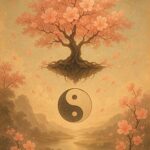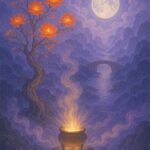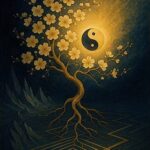Xieyi・The Rootless Tree:100 Verses-Verse 15#303

The poems of “The Rootless Tree” express a fundamental force rooted in harmony with heaven and earth, the cyclical flow of yin and yang, and the infinite potential of existence。
This painting is an expressive “Xieyi” in the tradition of “futu” (spiritual diagrams), passed down for generations in Wudang Mountain, China. It is drawn through a technique where energy flow (xingqi) channels the internal intention into visual form。 In the Taoist world, there exist spiritual and symbolic images called “futu”。
In the Taoist world, there exist spiritual and symbolic images called “futu”。
These are a type of talisman—not merely religious items, but expressive spiritual paintings that act directly on the mind of the viewer。
Since ancient times, many people have placed these Taoist-style “Xieyi” and futu in their homes, studies, or bedrooms, wishing for longevity, health, auspiciousness, and family harmony. Viewing such paintings was not just aesthetic appreciation, but an act of inviting the presence of the Dao into one’s life and tuning the body and mind。
Thus, “Xieyi” is more than artistic expression—it is a medium that bridges the spirit, life, and harmony with the universe。
This kind of artwork is not meant to be seen only with the eyes, but felt with the heart。
It communicates with the Dao, resonates with the qi of nature, and quietly stirs the viewer’s inner self。
Futu and “Xieyi” continue to live on from ancient times to this day as “sacred images that speak to the soul.”
Below, we present the original text of the philosophical poem “The Rootless Tree,” along with a modern Japanese translation and interpretation。
※ The author of “The Rootless Tree,” Zhang Sanfeng (1247–?), is also renowned as the founder of Tai Chi, and it is said that he applied the essence of this work to Tai Chi. As an additional note, we include an interpretation connecting this to the Tai Chi tradition of Wudang Mountain.
The Rootless Tree:100 Verses-Verse 15

Original Text
無根樹,花正瘦,枝頭清影月中浮。不羨繁華春滿眼,獨愛幽香冷夜留。
Modern Translation
A slender flower graces the rootless tree;
Its clear shadow floats on moonlit boughs.
Unmoved by springtime’s noisy splendour,It loves to leave a subtle scent in cold night.
Interpretation
1.[無根樹,花正瘦] ”Lean” flower – stripped of excess, purely essential.
2.[枝頭清影月中浮] Quiet silhouette in moonlight = noble solitude.
3.[不羨繁華春滿眼] Spurns transient splendour.
4.[獨愛幽香冷夜留] Prefers hidden fragrance over outward show.
Interpretation related to Tai Chi
•Depth over display; inner power in small, refined motion.
•Practice for self-cultivation, not applause.
•Quiet work breeds lasting aroma (qi).
Copyright © MASAKI WAKABAYASHI. All rights reserved.




